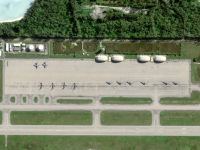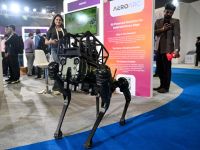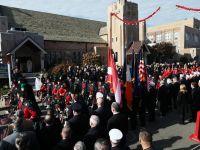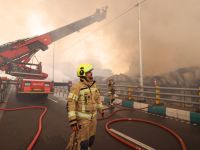HH Sheikh Hamdan bin Rashid Al Maktoum chairs AGM at DUBAL

For Dubai Aluminium (DUBAL), the entirely state-owned enterprise whose Jebel Ali operation ranks as the world’s largest single-site primary aluminium smelter using pre-bake anode technology – 2011 was again an excellent year. “DUBAL achieved record gross sales revenue of AED 11.144 billion (compared to AED 8.670 billion in 2010), with record net profits of AED 3.515 billion equating to approximately 31.5 per cent of gross sales revenue (2010: AED 2.129 billion), there by remaining one of the most profitable corporations in the Emirate of Dubai’s portfolio.
DUBAL’s leading position is further affirmed by compound annual revenue and profit growth rates from 1996 to 2011 of 13 per cent,” says HH Sheikh Hamdan bin Rashid Al Maktoum (Deputy Ruler of Dubai, UAE Minister of Finance and Chairman of the DUBAL Board), who also proudly acknowledged the high safety and environmental performance standards maintained by DUBAL.
DUBAL’s 2011 results were revealed by Abdulla J M Kalban (President & Chief Executive Officer), during the company’s General Assembly Meeting for 2011, held at DUBAL’s Jebel Ali site on Wednesday 21 March 2012 and attended by HH Sheikh Hamdan bin Rashid Al Maktoum (Deputy Ruler of Dubai, UAE Minister of Finance and Chairman of the DUBAL Board), members of the DUBAL Board of Directors and a representative from Investment Corporation of Dubai.
According to Kalban, DUBAL’s achievements in 2011 reflect a combination of higher production and sales volumes, plus the benefit of higher aluminium prices, coupled with sustained focus on controlling the cash conversion cost, the latter despite increasing pressure on the purchase prices of raw materials. “It’s also important to note that the improvement in DUBAL’s net profit was partly attributable to our company’s share in the profits of Emirates Aluminium (EMAL), which amounted to AED 622 million in 2011 during its first full year of production, whereas 2010 was still impacted by pre-operating expenses and costs that could not be capitalized contributing to the loss of AED 208 million.
Reducing budgeted capital expenditures and maintaining tight working capital control contributed significantly to achieving improved cash generation from operating activities and free cash flow. This provided support to maintain a very strong balance sheet for DUBAL,” says Kalban.
Widely acknowledged as the UAE’s industrial flagship, DUBAL began operating in 1979 with an initial production capacity of 135,000 metric tonnes per annum. The company has since undergone a series of major expansion projects, together increasing the production capacity of DUBAL’s Jebel Ali plant more than seven-fold to more than one million metric tonnes per annum.
The use of advanced in-house developed technologies that offer improved productivity and other operating benefits, together with higher amperage levels and efficiency improvements, enabled DUBAL to produce 1,014,795 metric tonnes of hot metal in 2011. “This marked the second consecutive year that DUBAL has surpassed the one million metric tonne hot metal milestone, and also represented growth of 1.3 per cent on the 1,002,014 metric tonnes produced in 2010,” continues Kalban. “Going forward, ever-higher hot metal production is expected each year, driven by further productivity gains.”
Moreover, both cast product and sales volumes exceeded one million metric tonnes for the third consecutive year, with DUBAL selling 1.7 per cent more metal in 2011 than in 2010. These statistics highlight the company’s ranking as a major supplier of premium quality, highest purity aluminium to the global market, especially as more than 90 per cent of DUBAL’s annual production is exported to more than 300 customers in at least 50 countries in various parts of the world.
DUBAL’s performance also continued to improve in terms of employee safety. The company’s total recordable injury frequency rate (“TRIFR”, comprising lost time injuries, restricted work and medical treatments per million hours) decreased from 4.21 in 2010 to 3.55 by the end of 2011 — an improvement of 15.7 per cent over the last three years. Overall, a 95.5 per cent drop in lost time injuries (“LTIs”) has been achieved since 2004.
Importantly, DUBAL met or outperformed virtually all measures relating to the environment in 2011, specifically with regard to overall perfluorocarbon (“PFC”) emissions, which have dropped by 88 per cent compared to 1990 levels. DUBAL’s total fluoride emissions continued to decrease throughout 2011, resulting in an overall decline of 38 per cent since 2000.
With regard to occupational health, DUBAL achieved zero lost work days due to heat stress for the sixth year in a row and none due to heat rash for the fifth consecutive year. 2011 also witnessed the third biennial Voice Your Opinion employee satisfaction survey, in which 84 per cent of employees participated. The survey, conducted by Hay Group (an international management consultancy) and analysed using industry benchmarks, showed that DUBAL ranks 7 per cent above the Global Industry Norm, 4 per cent above the Middle East Norm and on par with the High Performing Companies Norm.
Aiming to be a clear leader by example, DUBAL has spear-headed the quality movement in the UAE, adheres to international operating standards in all aspects of its business operations and is an employer of choice in Dubai. Undoubtedly a source of national pride, DUBAL is a strong proponent of Emiratization — more than 65 per cent of employees at senior management level are UAE Nationals, while 15.4 per cent of the total DUBAL workforce comprises local employees.
Indeed, DUBAL’s efforts in this regard earned the company a 2010 Dubai Human Development Award (“DHDA”), which was presented during the annual Business Excellence Awards in April 2011, organized by the Dubai Department of Economic Development under the patronage of H H Sheikh Mohammed bin Rashid Al Maktoum (Vice President and Prime Minister of the UAE and Ruler of Dubai). “The 2010 DHDA is the third such accolade for DUBAL, our company having previously won the DHDA in 2002 and the DHDA (Gold) in 2006 – the latter precluding the company from entering the competition again until last year,” says Kalban. “In the citation for the 2010 Dubai Human Development Award, DUBAL was commended in particular for the company’s business model that drives the national goal of empowering Emirati talent.”
In terms of foreign investments to secure raw material stocks, good progress was made during 2011. DUBAL is currently engaged in strategic upstream bauxite/alumina projects in Brazil, Republic of Guinea, and Cameroon, that are in various stages of development.
The performance of DUBAL’s proprietary DX Reduction Technology continued to advance throughout the year: the amperage of the 40 DX Reduction Technology cells at DUBAL’s Jebel Ali site has been increased to 380 kA, while parallel efforts enabled a lowering in energy consumption, higher efficiency operating parameters and new emissions benchmarks.
“The operating parameters being recorded consistently clearly demonstrate the outstanding performance capabilities of DX Reduction Technology at industrial scale and put it at the level of the best available technologies,” says Kalban. “DX Reduction Technology has also been installed in the EMAL Phase I potlines, where the cells are performing as impressively as at DUBAL.”
Through ongoing research and development, DUBAL’s DX Technology cells have been re-designed to enable operation at even higher amperages. Five new generation cells, built in the pilot line at Jebel Ali, began operating at 420 kA at the end of August 2010. Mid-2011, the amperage of these pilot cells was increased gradually and reached 440 kA in February 2012, with stable results. The improved technology — known as DX+ Technology — is based directly on the proven, inherently robust DX Technology.
The industrial version is targeted to achieve specific energy consumption of less than 12.98 kWh/kg Al; with the average yield per pot expected to be 3.4 mt/day. The anode effect frequency is very low but, more importantly, the average duration is less than 10 seconds (a world benchmark for lowering PFC emissions). Importantly, DX+ Technology has been specified for the 444-cell potline of EMAL Phase II; and its installation will enjoy support from DUBAL of similar scope and scale.
Kalban also reported to the DUBAL Board on the progress of the company’s investment projects. The most notable of these is EMAL in the Al Taweelah area of Abu Dhabi, a joint venture in which DUBAL is a 50 per cent shareholder with Mubadala Development Company. Commissioning of all 756 reduction cells in EMAL Phase I was completed in record time by the end of 2010, enabling the plant to operate at its full capacity of 740,000 metric tonnes per annum from 2011 onwards. Indeed, in terms of its contractual duties, DUBAL marketed and sold 748,000 mt of EMAL metal across the world during 2011.
EMAL Phase II was announced in July 2011. A new 444-cell potline will be built which, together with a technology upgrade of the existing cells, will increase EMAL’s annual production capacity to 1.3 million metric tonnes by the end of 2014. DUBAL DX Technology has been licensed to and installed at EMAL Phase I; while DX+ Technology has been specified for EMAL Phase II.






